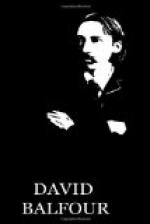“And suppose we took up Mr. Balfour’s cause to-morrow?” said Stewart Hall. “I am much deceived or we should find so many impediments thrown in our path, as that James should have been hanged before we had found a court to hear us. This is a great scandal, but I suppose we have none of us forgot a greater still, I mean the matter of the Lady Grange. The woman was still in durance; my friend Mr. Hope of Rankeillor did what was humanly possible; and how did he speed? He never got a warrant! Well, it’ll be the same now; the same weapons will be used. This is a scene, gentlemen, of clan animosity. The hatred of the name which I have the honor to bear, rages in high quarters. There is nothing here to be viewed but naked Campbell spite and scurvy Campbell intrigue.”
You may be sure this was to touch a welcome topic, and I sat for some time in the midst of my learned counsel, almost deaved with their talk but extremely little the wiser for its purport. The Writer was led into some hot expressions; Colstoun must take him up and set him right; the rest joined in on different sides, but all pretty noisy; the Duke of Argyle was beaten like a blanket; King George came in for a few digs in the by-going and a great deal of rather elaborate defence: and there was only one person that seemed to be forgotten, and that was James of the Glens.
Through all this Mr. Miller sat quiet. He was a slip of an oldish gentleman, ruddy and twinkling; he spoke in a smooth rich voice, with an infinite effect of pawkiness, dealing out each word the way an actor does, to give the most expression possible; and even now, when he was silent, and sat there with his wig laid aside, his glass in both hands, his mouth funnily pursed, and his chin out, he seemed the mere picture of a merry slyness. It was plain he had a word to say, and waited for the fit occasion.
It came presently. Colstoun had wound up one of his speeches with some expression of their duty to their client. His brother sheriff was pleased, I suppose, with the transition. He took the table in his confidence with a gesture and a look.
“That suggests to me a consideration which seems overlooked,” said he. “The interest of our client goes certainly before all, but the world does not come to an end with James Stewart.” Whereat he cocked his eye. “I might condescend, exempli gratia, upon a Mr. George Brown, a Mr. Thomas Miller, and a Mr. David Balfour. Mr. David Balfour has a very good ground of complaint, and I think, gentlemen—if his story was properly red out—I think there would be a number of wigs on the green.”
The whole table turned to him with a common movement.
“Properly handled and carefully red out, his is a story that could scarcely fail to have some consequence,” he continued. “The whole administration of justice, from its highest officer downward, would be totally discredited; and it looks to me as if they would need to be replaced.” He seemed to shine with cunning as he said it. “And I need not point out to ye that this of Mr. Balfour’s would be a remarkable bonny cause to appear in,” he added.




